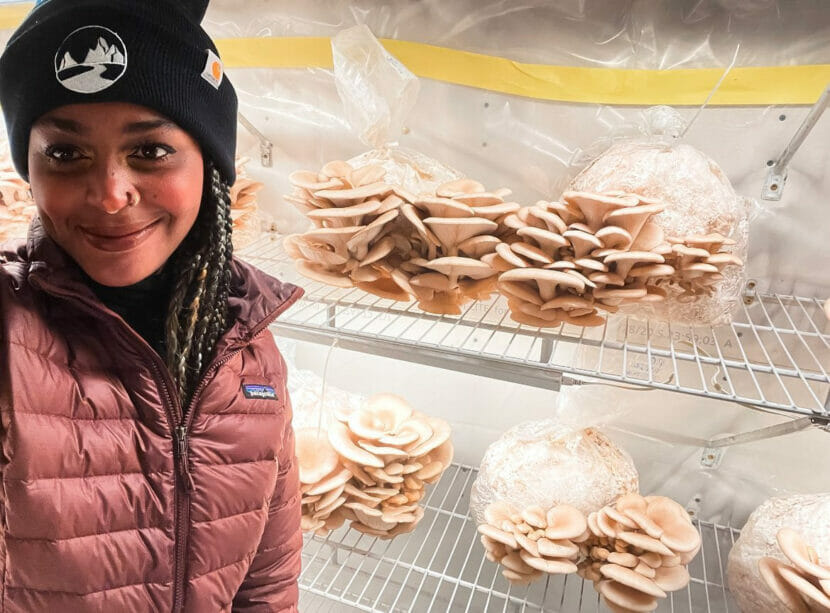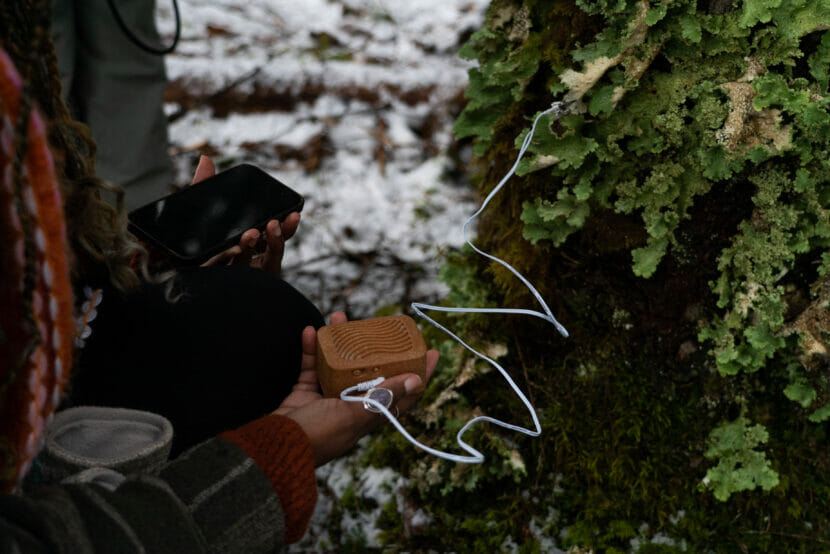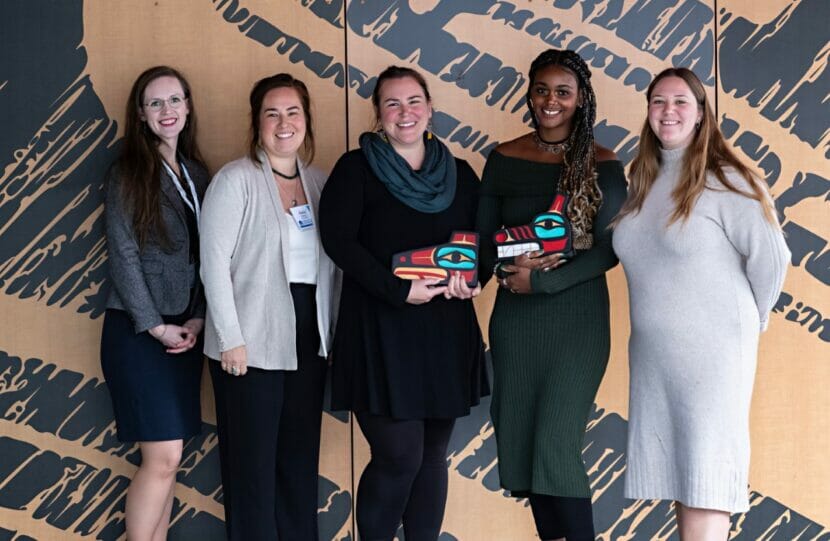
Alannah Johnson fell in love with the fungi of Juneau’s rainforest nearly a decade ago.
Now, she’s selling delicious mushrooms from her gourmet and medicinal mushroom farm, New Earth Fungi.
On a snowy day at the Brotherhood Bridge Trail, Alannah Johnson recalls the lush green of summertime.
“This whole entire area would just be like, covered with moss. And it kind of reminds me of a little fairyland,” she said.
As her boots crunch along the trail, she stays vigilant, peeking around trees.
“Under a branch or like the space in the bottom of a tree. There’s usually mushrooms in there,” she says.
In the February cold, there are only conks, a woody, bitter shelf mushroom. But Johnson says the forest is abundant with edible mushrooms during the rest of the year. Plump white puff balls as the summer begins, the golden-yellow “chicken of the woods” later in the season, and trumpet-shaped winter chanterelles as summer turns to fall.
Johnson has a passion for microbiology, and a sharp eye for the tiny details of mushroom identification. Subtle differences in colors, shapes and even the spores of fungi help her to tell them apart. And her drive to find them keeps her in tune with the forest.
“I just love the challenge of looking for mushrooms and like paying really close attention to detail,” she said.

She says mushrooms have helped her feel more connected to nature and the food she eats. And those values are the core of her business New Earth Fungi.
Mushrooms have always been a hobby for Johnson. Growing up in California, she started by cultivating shiitakes on logs. But the hobby grew to a full-on passion after she transferred to the University of Alaska Southeast during her sophomore year.
She was taken by the diversity of Southeast’s forests, where she made frequent trips for “mushroom forays,” gathering mushrooms to identify, study and eat. As the founder of the UAS mycology club, she started inviting others to join her.
“I put up some fliers announcing my first foray. And I was really shocked at how many people showed up. I think the first group was about 35 people,” she said. “I didn’t realize that there are other people who were also super passionate about learning about fungi.”
Now, Johnson regularly leads forays for tourists and locals alike. Equipped with wicker baskets and a stack of field guides, she works to demystify fungi as food.
Johnson always knew she wanted to share her passion for mushrooms with others, but she didn’t know how until the pandemic hit. She was doing a post-grad stint as a Peace Corps volunteer in the Caribbean.
“And all Peace Corps from all around the world were evacuated back to the U.S.,” she said. “So I was just like, I don’t know what I’m gonna do. I felt depressed about the whole situation. And then I was like this is the time to start my mushroom business.”
Johnson had no experience as an entrepreneur, but she knew there was a demand for locally-sourced mushrooms. So she started by cultivating them in her home. Her first batch was oyster mushrooms, a popular fluted fungi known for its mild savory flavor.
“They’re pretty easy for me to grow. And a lot of people are familiar with them,” she said. “So I started like, okay, what do people want to eat?”
Soon, she wanted to add new flavors and textures to local palettes with the lion’s mane mushroom, a shaggy white fungus.
“They see it in the grocery store, they’re like, what is that weird thing, and it’s like got little, like, tentacles,” she said. “But then I tell them how to cook it. And now it’s become more popular. And I tell them what the medicinal benefits are. And they’re just in love with it,” she said.
Slowly, Johnson started to introduce new varieties and new mushroom products, like medicinal mushroom tonics. She now cultivates eight varieties. They grow out of large plastic bags that line the white metal shelves of her fruiting room, which she operates out of her home.
A combination of education and cultivation form the foundation of New Earth Fungi. Johnson refined her business plan at the Path to Prosperity three-day business boot camp, an annual business development competition hosted by Spruce Root, a nonprofit focused on community development.

She pitched New Earth Fungi, alongside 12 other small business finalists. A team of independent judges selected Johnson as one of two recipients of a $25,000 small business grant.
Johnson said the news came as a great relief.
“When I got off the phone I just broke down,” she said. “I just started crying because I feel like I’ve put so much work, time and energy into all of this and sometimes it can feel like there’s definitely days where I’m like, why am I doing this?”
She says it’s been exciting to see her mushrooms out in the community. They’re sold at grocery stores like Juneau Natural and Rainbow Foods. Some restaurants like Red Spruce, Black Moon Coven and Zerelda’s make dishes centered around them. And individuals who buy them or gather them on mushroom forays will tag her on social media to show off their mushroom dishes.
But she’s been struggling to keep up with growing demand. Cultivating mushrooms at a commercial scale demands sterile conditions to keep mold and undesirable fungi at bay. Johnson says that’s been really hard to do while operating out of her house.
She says she plans to use the prize money to invest in mushroom sterilizing equipment, and maybe a larger commercial space. And plans to hire some help too.
“I think that would be wonderful to hire some people who are really passionate about cultivating mushrooms and participating in mushroom education,” she said.
And most importantly, she believes that improving the cultivation process will free up more time for educational events, where she hopes to forge stronger connections with the land and local food.
“It’s just such a relaxing but healing thing to just be connected and know what things are around you, to have to have a greater appreciation and respect for food, wild food, food that we grow,” she said. “And I feel so connected to this place through mushrooms. It makes me feel warm and fuzzy inside.”